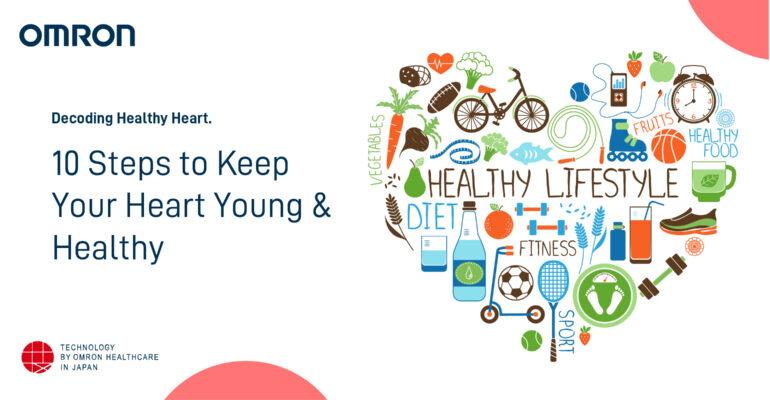10 Steps to Keep Your Heart Young and Healthy
August 8, 2023 2024-01-16 16:4310 Steps to Keep Your Heart Young and Healthy

10 Steps to Keep Your Heart Young and Healthy
Your heart is a vital organ that pumps blood throughout your body. It is essential to keep your heart healthy by making healthy lifestyle choices. Cardiovascular diseases (CVDs) are the leading cause of death globally.[1]
An estimated 17.9 million people died from CVDs in 2019, representing 32% of all global deaths. Of these deaths, 85% were due to heart attack and stroke. Most cardiovascular diseases can be prevented by addressing behavioral risk factors such as tobacco use, unhealthy diet and obesity, physical inactivity and harmful use of alcohol.[2]
As we age, the importance of maintaining heart health becomes even more critical. Aging can bring about changes in blood vessels and heart function, potentially increasing the risk of heart disease Thankfully, there are steps we can take to ensure our hearts stay youthful and robust.[3]
Here are 10 steps you can take:
Maintain a Balanced Diet
Eating a heart-healthy diet is the cornerstone of cardiovascular wellness. Focus on consuming a variety of fruits, vegetables, whole grains, lean proteins, and healthy fats. Limit your intake of processed foods, sugary snacks, and excessive salt. Prioritize foods rich in antioxidants, like berries, and Omega-3 fatty acids, found in fatty fish like salmon.
Stay Physically Active
Regular exercise is essential for maintaining heart health. Aim for at least 150 minutes of moderate-intensity aerobic activity or 75 minutes of vigorous-intensity activity each week. Activities like brisk walking, jogging, swimming, and cycling contribute to cardiovascular fitness, improve blood circulation, and help control weight.[4]
Manage Stress
Chronic stress can negatively impact heart health. Practice stress-reduction techniques such as meditation, deep breathing, yoga, or engaging in hobbies you enjoy. Adequate sleep and maintaining a healthy work-life balance are also crucial for stress management.
Don’t Smoke
Smoking is a major risk factor for heart disease. If you smoke, quitting is one of the most significant steps you can take to improve your heart health. Seek support from friends, family, or professionals to help you quit successfully.
Limit Alcohol Intake
Excessive alcohol consumption can contribute to high blood pressure, obesity, and heart disease. If you choose to drink, do so in moderation. The recommended limits are up to one drink per day for women and up to two drinks per day for men.
Monitor Blood Pressure
High blood pressure puts strain on the heart and blood vessels, increasing the risk of heart disease. Regularly monitor your blood pressure and take steps to keep it within a healthy range through diet, exercise, and, if necessary, medication.
OMRON blood pressure monitor offers reliable and user-friendly monitoring for home use. This provides accurate readings that you can easily share with your healthcare provider, allowing for better-informed decisions about your heart health.[5]
Control Cholesterol Levels
High levels of “bad” LDL cholesterol can lead to the buildup of plaque in arteries, increasing the risk of heart disease. Manage your cholesterol levels by eating a heart-healthy diet, exercising, and, if recommended by your doctor, taking prescribed medications.
Maintain a Healthy Weight
Excess weight, especially around the waistline, can contribute to heart disease. Prioritize portion control and choose nutrient-dense foods to manage weight effectively. Combine a balanced diet with regular exercise to foster a strong and resilient heart.
Stay Hydrated
Adequate hydration is essential for maintaining healthy blood circulation and supporting overall heart function. Carry a reusable water bottle to remind yourself to drink water throughout the day. This simple habit can have a profound impact on your heart health.
Regular Health Check-ups
Schedule regular visits to your healthcare provider for comprehensive check-ups. These appointments allow for early detection and management of any heart-related issues or risk factors. Proactively discussing your heart health concerns with your doctor empowers you to make informed decisions for a heart-healthy lifestyle.
Wrap-Up
By incorporating these ten steps into your lifestyle, you can significantly contribute to keeping your heart young and healthy. Remember that small, consistent changes can lead to remarkable improvements in your cardiovascular health. As you prioritize your heart, you’re investing in a future filled with vitality, energy, and the freedom to enjoy life to the fullest.
Reference:
- https://www.who.int/health-topics/cardiovascular-diseases#tab=tab_1
- https://www.who.int/news-room/fact-sheets/detail/cardiovascular-diseases-(cvds)
- https://www.mayoclinic.org/diseases-conditions/heart-disease/in-depth/heart-disease-prevention/art-20046502
- https://www.cdc.gov/physicalactivity/basics/adults/index.htm
- https://www.omronbrandshop.com/blood-pressure-monitors/






